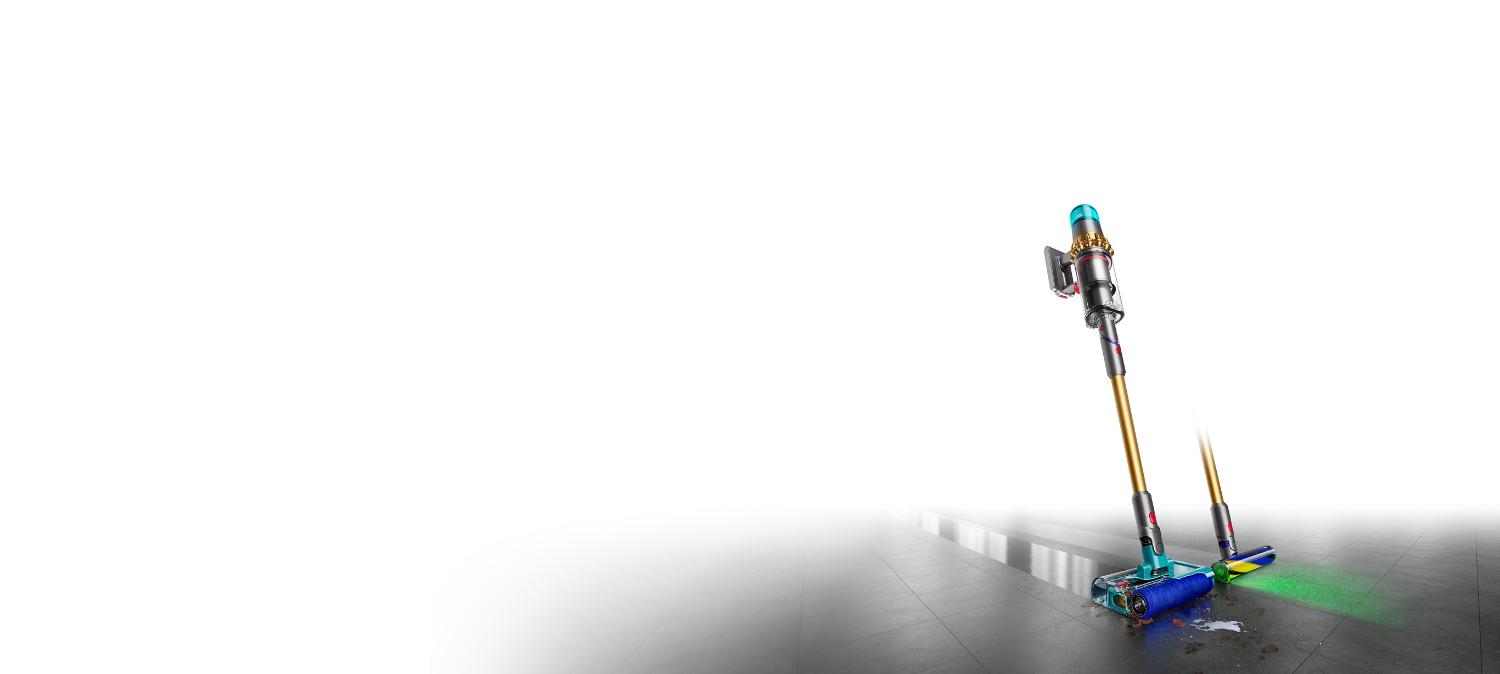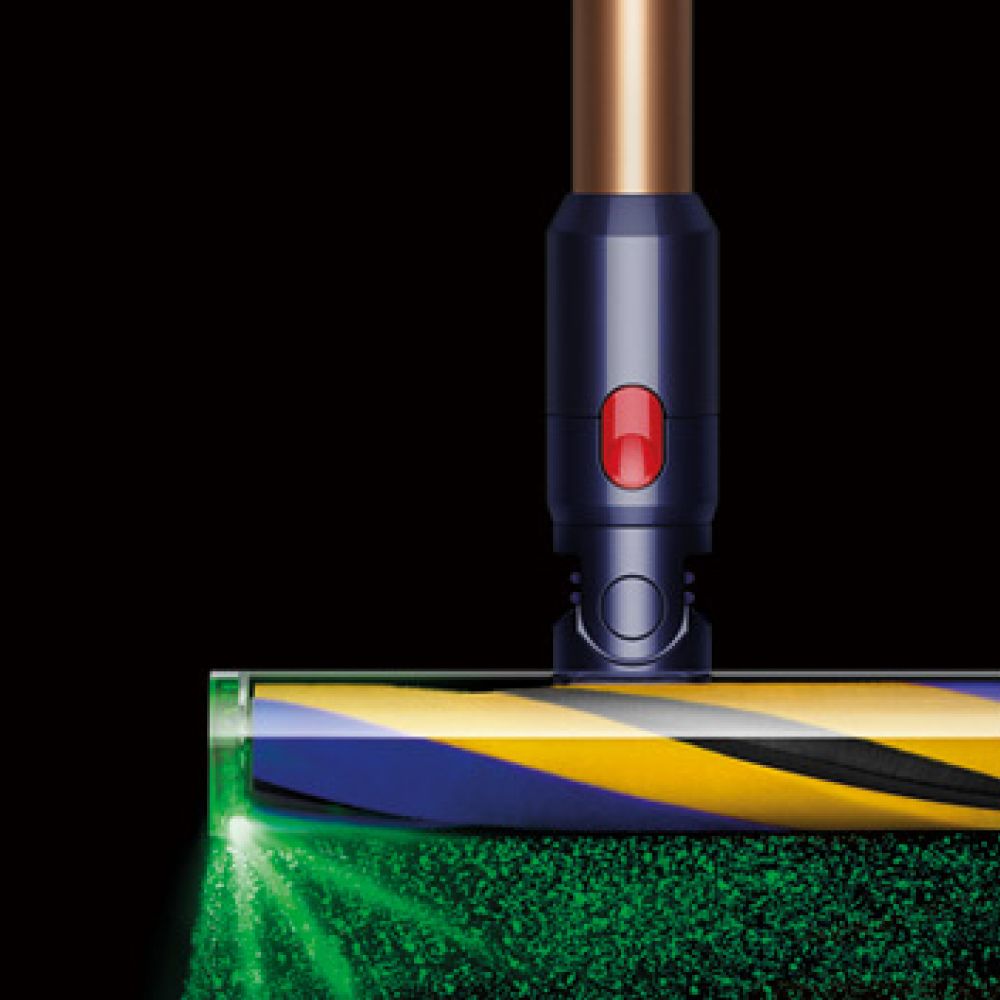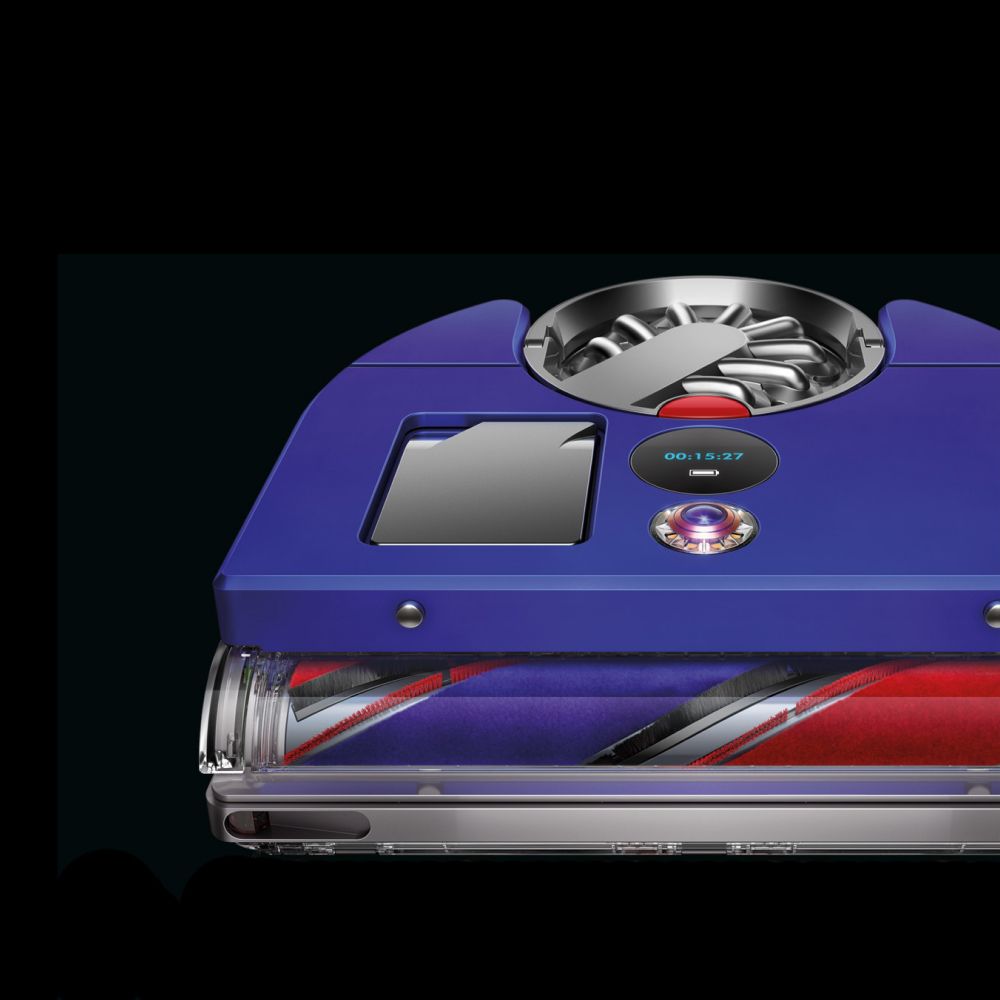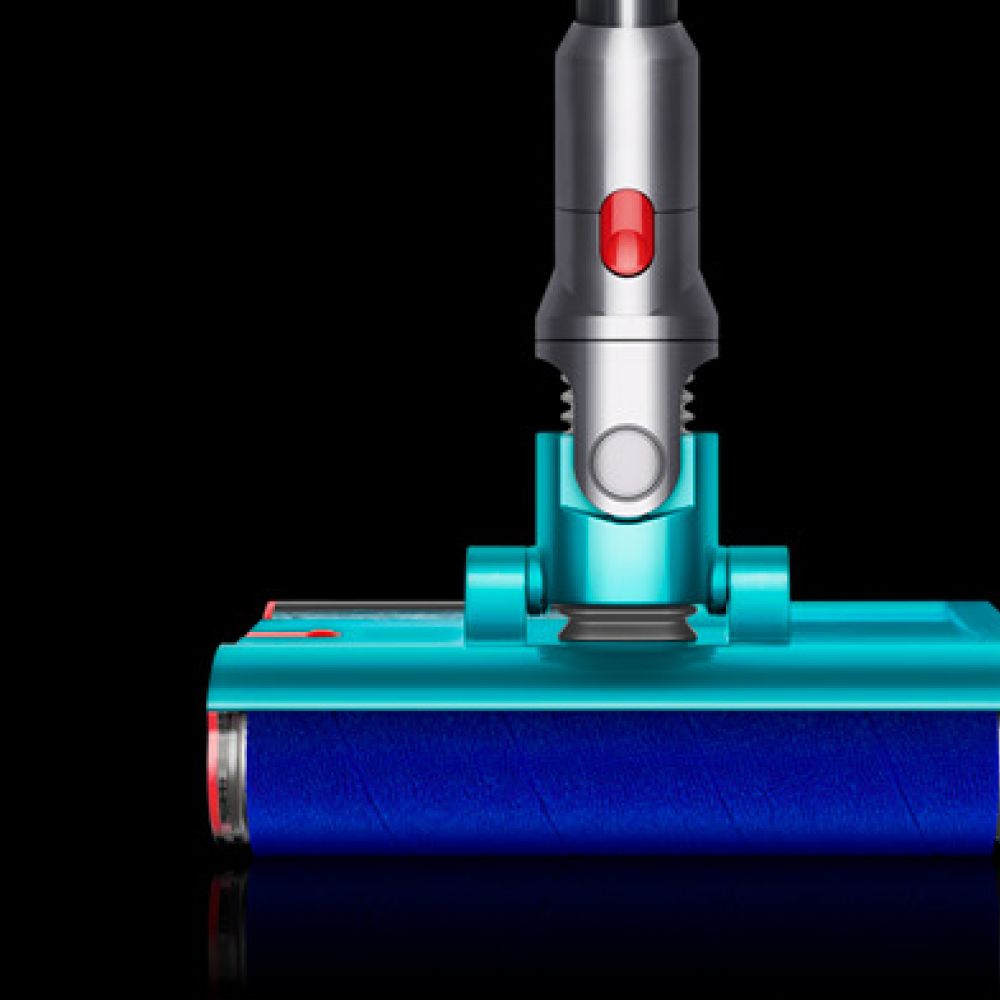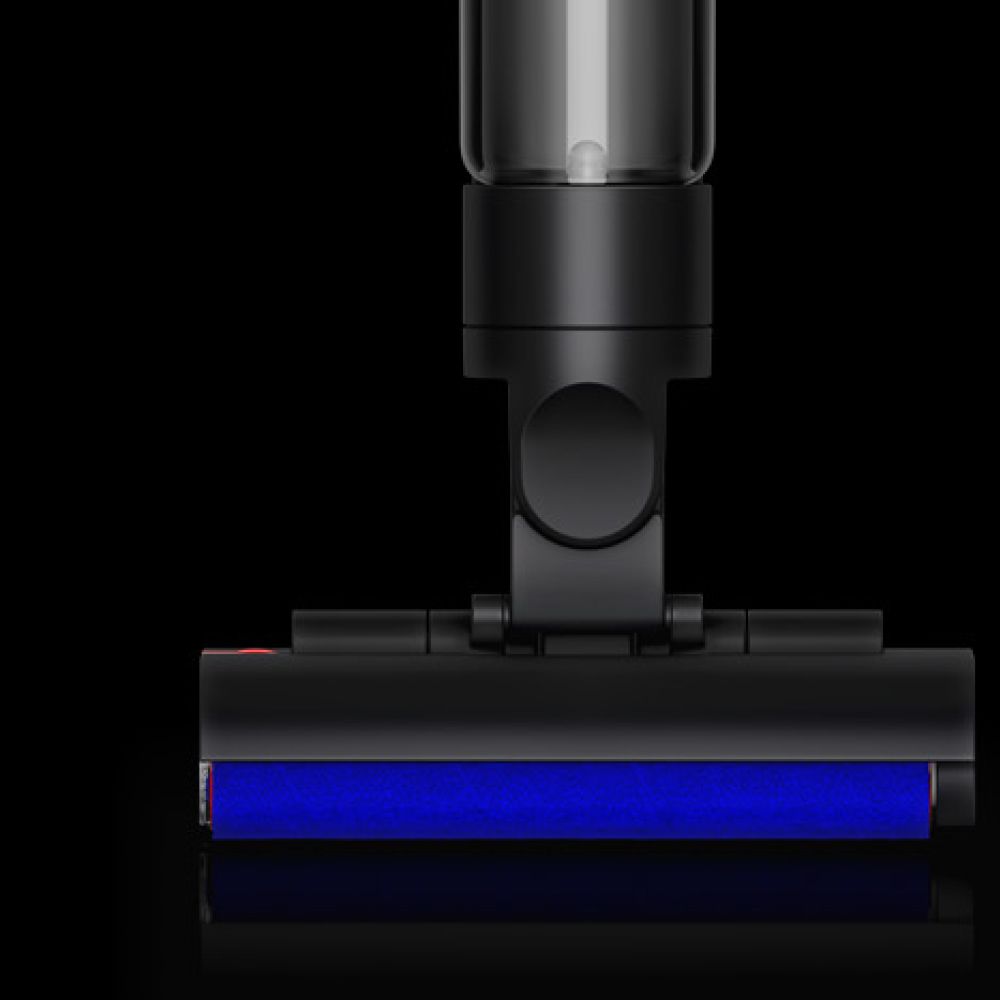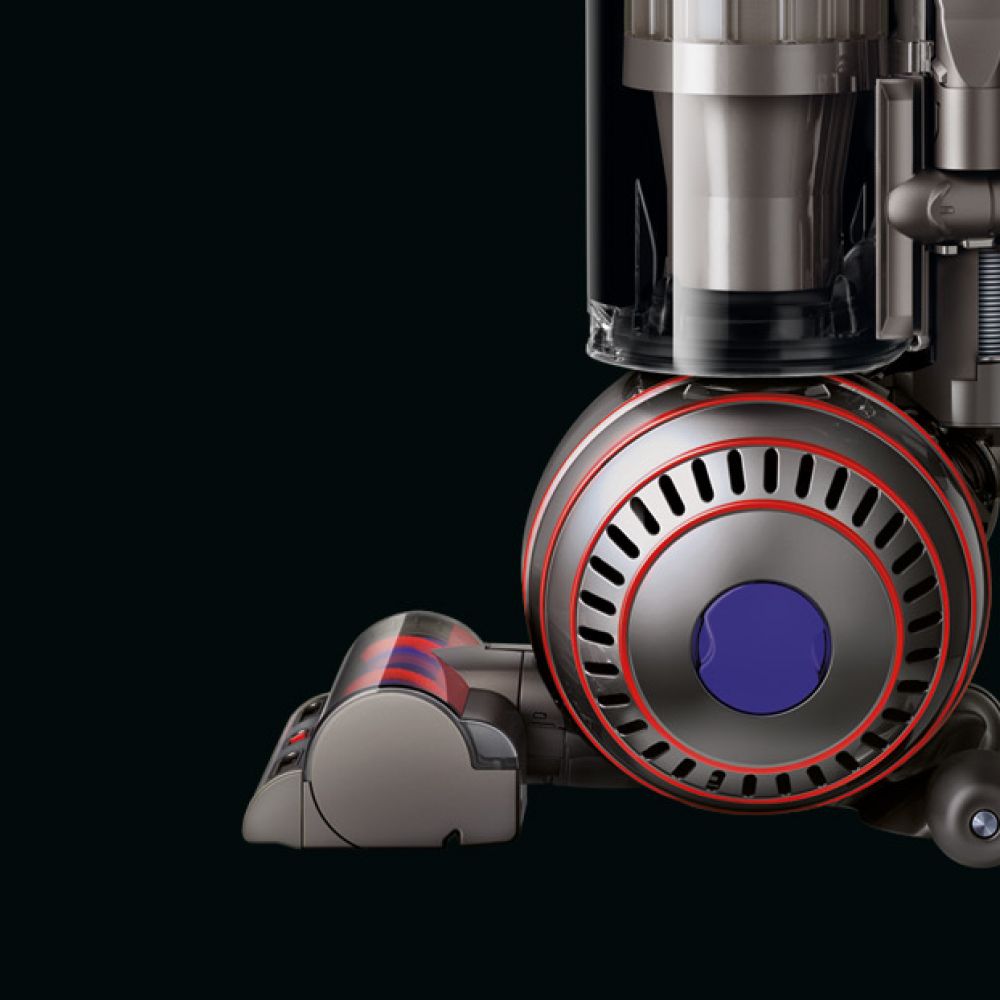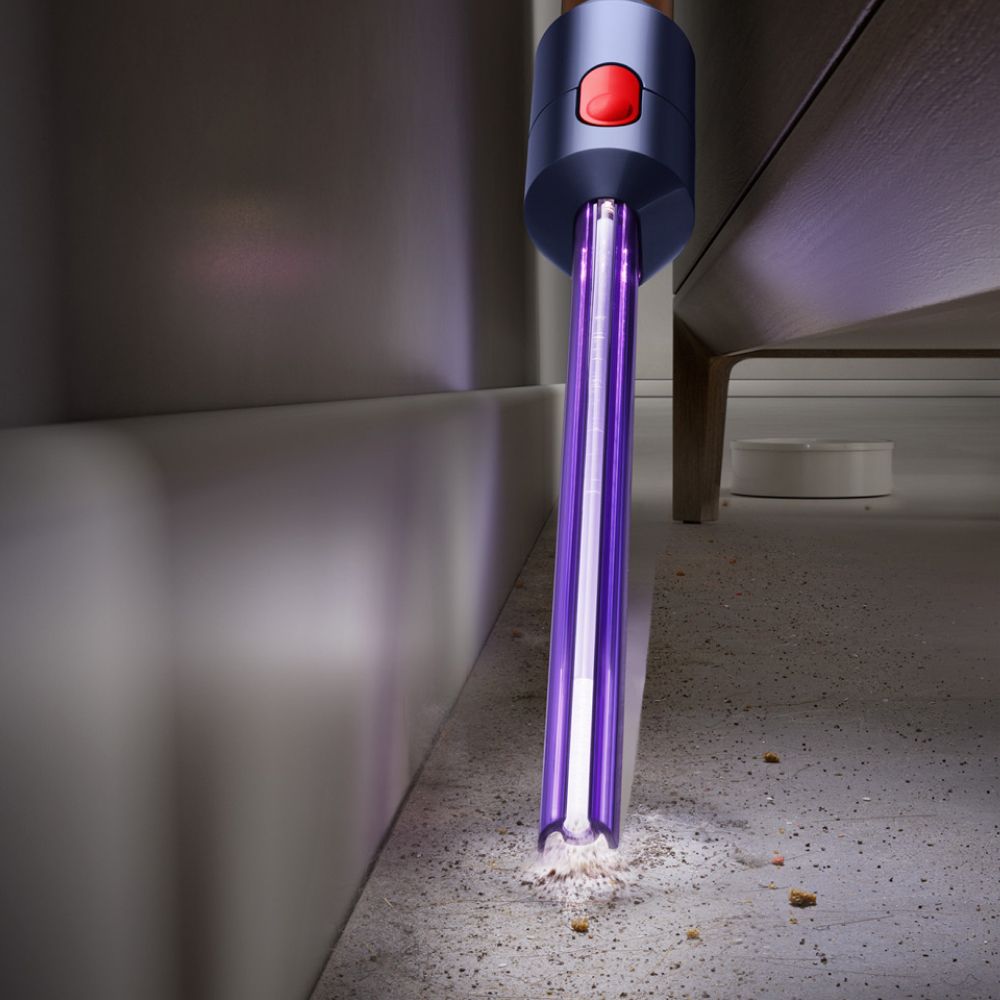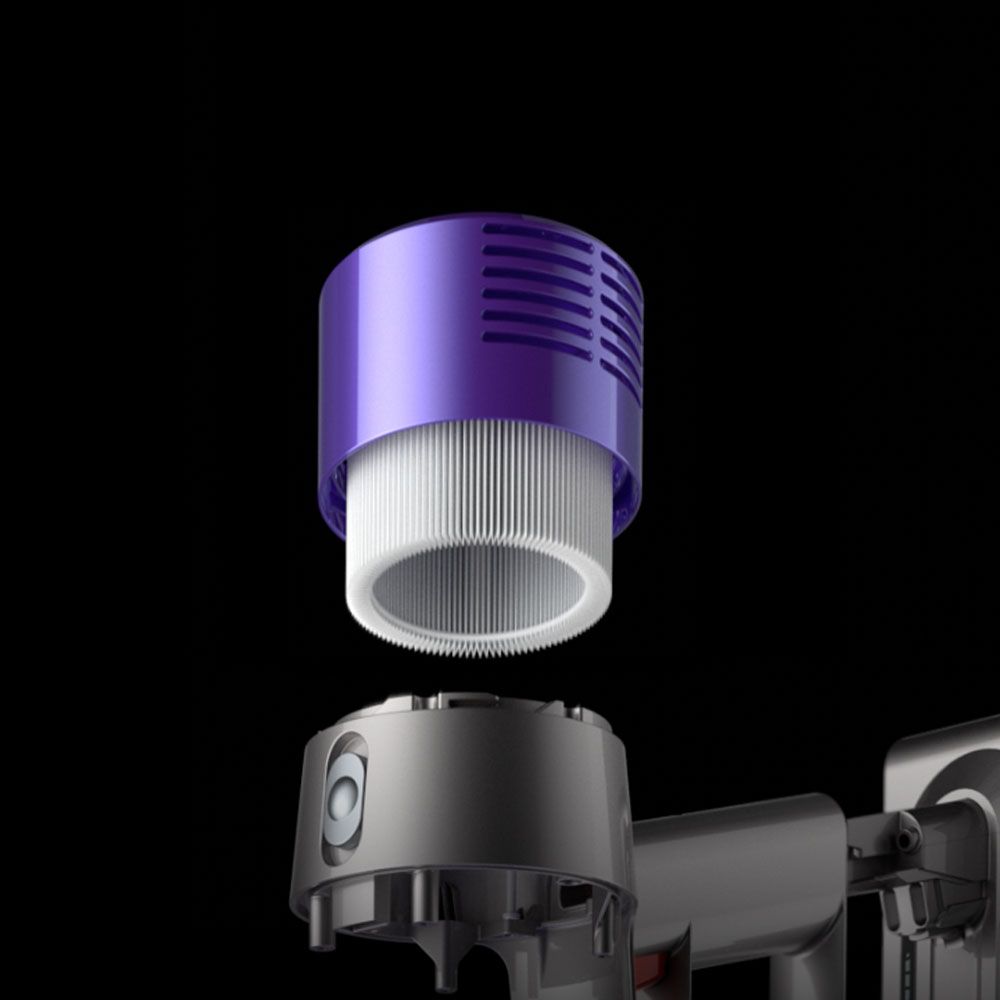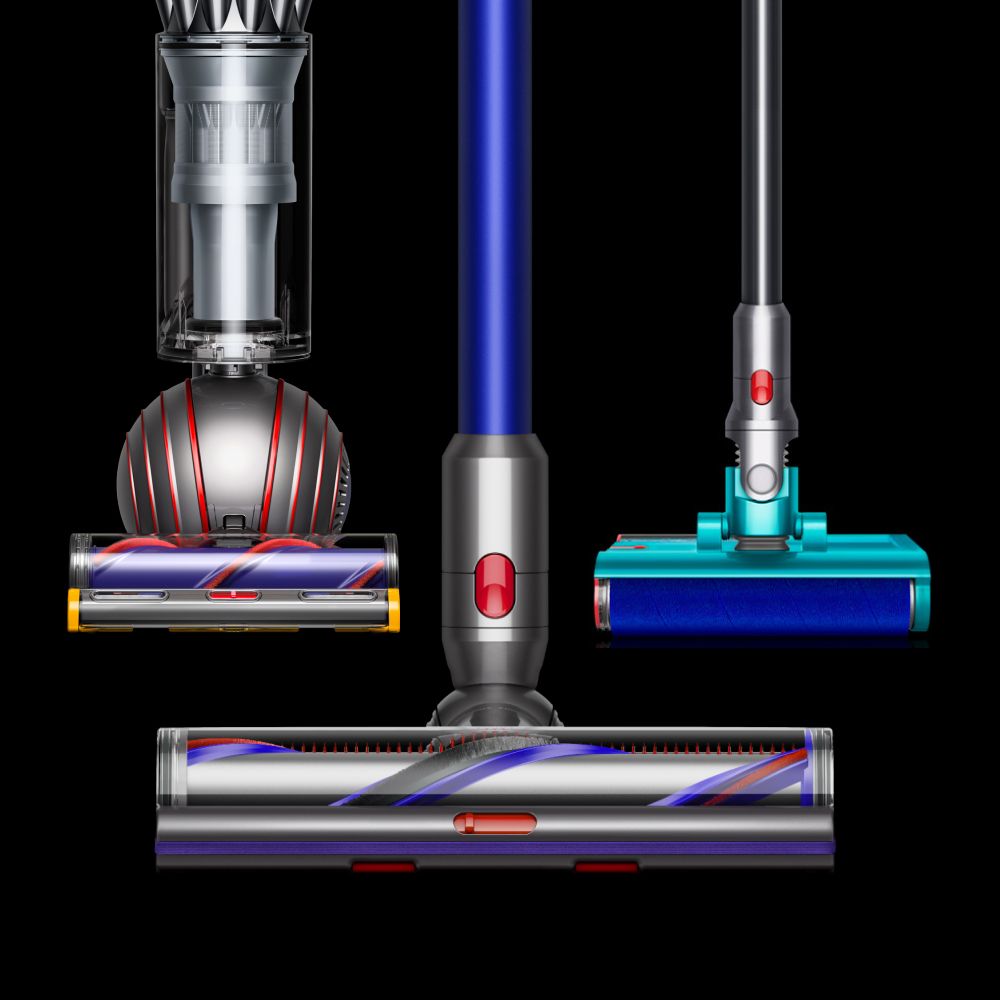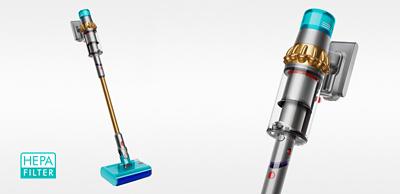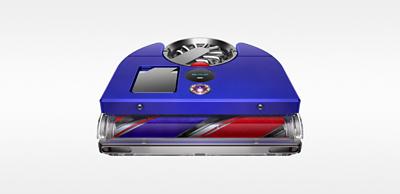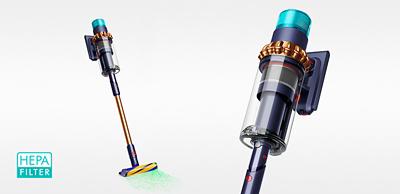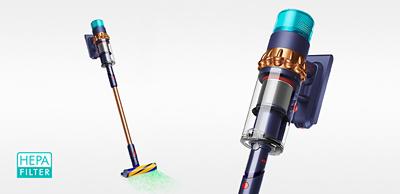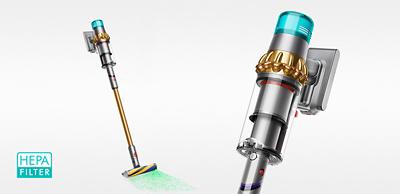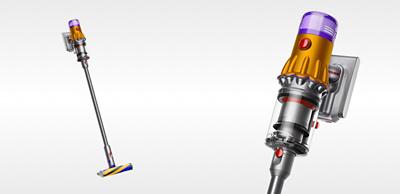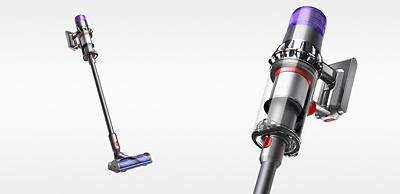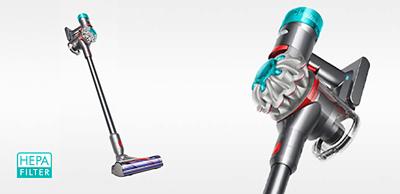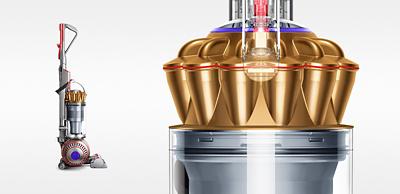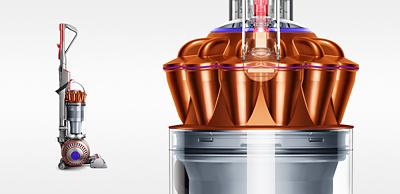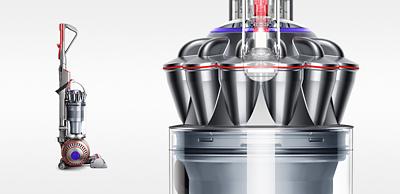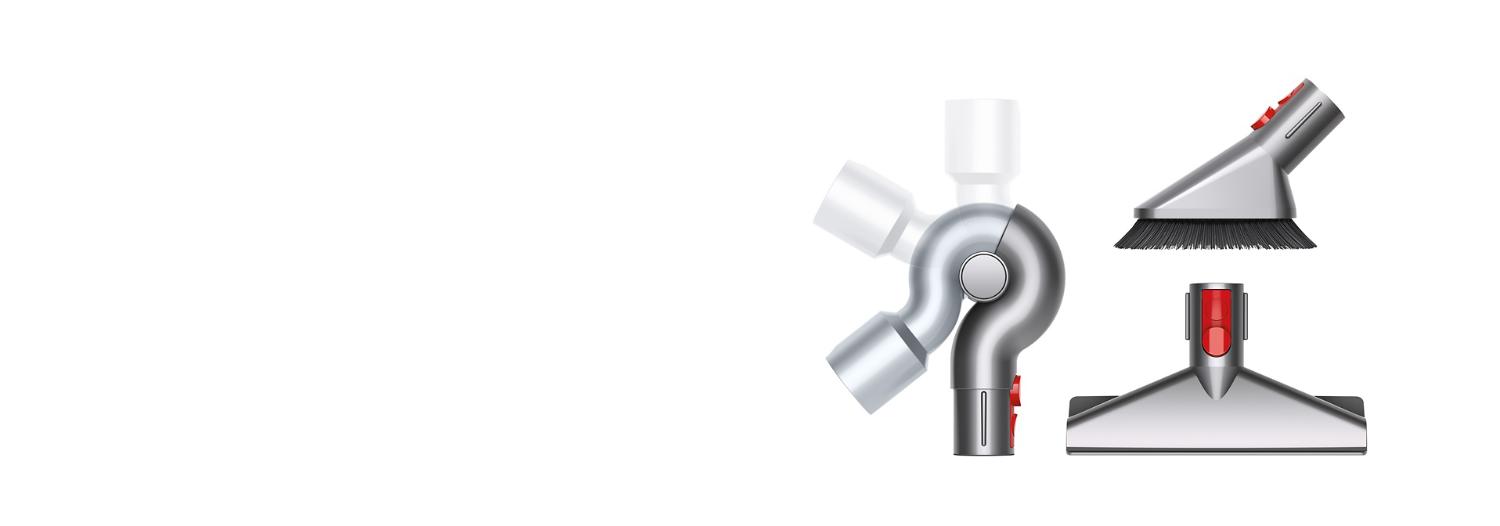Vacuum Cleaners
Floorcare
Shop our full range of cordless and corded vacuums, robots, wet and dry vacuums and specialized wet floor cleaners.

Vacuum Cleaners
Find the right vacuum for you
Answer four quick questions to find the cordless vacuum that performs best for you.
Discover pioneering Dyson floorcare technology
This is a carousel with slides. Use Next and Previous buttons to navigate, or jump to a slide with the slide dots.
Dyson Hyperdymium™ motor
Powerful, lightweight digital motor helps suck up microscopic dust and large debris

Dyson Hyperdymium™ motor
Powerful, lightweight digital motor helps suck up microscopic dust and large debris
Multi-stage filtration
Dyson’s fully-sealed filtration traps microscopic particles and allergens – and expels cleaner air.

Multi-stage filtration
Dyson’s fully-sealed filtration traps microscopic particles and allergens – and expels cleaner air.
Root Cyclone™ technology
Dyson’s patented cyclones capture dust and debris from the airflow, so there’s no loss of suction.

Root Cyclone™ technology
Dyson’s patented cyclones capture dust and debris from the airflow, so there’s no loss of suction.
Self-cleaning wet rollers
On every rotation, two counter-rotating rollers extract the dirt before being evenly hydrated – washing with clean water from start to finish.

Self-cleaning wet rollers
On every rotation, two counter-rotating rollers extract the dirt before being evenly hydrated – washing with clean water from start to finish.
Intelligent 360° vision system
Analyzes its surroundings, building a map of your home, so the robot vacuum can see where it needs to clean

Intelligent 360° vision system
Analyzes its surroundings, building a map of your home, so the robot vacuum can see where it needs to clean
Shop floor cleaners range
Dyson WashG1™
Powerful counter-rotating rollers
Controlled full-width roller hydration
Separated hygienic disposal
3 accessories
See all Hide-
Charger
Charges your wet cleaner without the need for the Charging dock.

-
Dual microfiber rollers
Dual microfiber rollers for your Dyson WashG1

-
Charging dock
Place your wet cleaner on the charging dock for recharging or self cleaning.

- Select a complimentary tool worth $59.99 at checkout.
 &
&

Dyson V15s Detect Submarine™ Absolute
2810
Dyson V15s Detect Submarine™ Absolute
5
Star
1797
4
Star
492
3
Star
223
2
Star
108
1
Star
190
Deep cleans. Detangles. Washes. All in one machine.
Up to 60 minutes of run time*
Only from Dyson: HEPA filtration, built-in tool and exclusive gold color
3 cleaner heads and 4 accessories
See all Hide-
Submarine™ Wet Roller Head
Submarine™ wet roller head removes spills and tough stains, using clean water from start to finish.

-
Fluffy Optic™ cleaner head
Reveals microscopic dust on hard floors. Soft nylon and anti-static carbon fiber filaments capture dust from hard floors.

-
Digital Motorbar™ cleaner head
Intelligently adapts power across floor types to deep clean carpets and hard floors. De-tangling vanes automatically clear wrapped hair from the brush bar as you clean. Colors may vary.

-
Combination tool
Two tools in one – wide nozzle and brush, for quick switching between tasks

-
Built-in dusting and crevice tool
Wand detaches with a click to reveal a ready-to-go crevice tool stored inside for on-the-spot cleans.

-
Hair screw tool
Anti-tangle conical brush bar picks up long hair and pet hair. Fast. Motor-driven cleaning for small spaces.

-
Drip Tray
Tray to place your submarine wet roller head.

-
Charger
Charges your vacuum with or without the Wall Dok™.

-
Docking station
Wall-mounted dock to recharge your vacuum and tidily store tools.

 &
&

Promotion
Shop vacuum cleaner range
Dyson 360 Vis Nav™
360° vision in the world's most powerful robot⁷
Powerful Dyson suction
Control your robot vacuum through the MyDyson™ app for smarter cleaning, wherever you are
1 cleaner head and 2 accessories
See all Hide-
Triple-action brush bar
Deep cleans edge-to-edge across all floor types.

-
Dock
Place anywhere in your home. The robot automatically returns to its dock to charge when needed. This item does not come with the Charging cable. Colors may vary.

-
Charging cable

-
Dock & charger

With all models
- Select a free dok worth $89.99 at checkout.
 &
&

Dyson Gen5outsize Absolute
9657
Dyson Gen5outsize Absolute
5
Star
6571
4
Star
1546
3
Star
596
2
Star
269
1
Star
675
Our most powerful cordless vacuum, for bigger cleans.ˣ
140 minutes of run time**
Only from Dyson: Exclusive prussian blue and copper color
2 cleaner heads and 5 accessories
See all Hide-
Fluffy Optic™ cleaner head
A precisely angled blade of light reveals twice the amount of invisible dust on hard floors.

-
Digital Motorbar™ XL cleaner head
Extra wide cleaner head intelligently adapts power across floor types to deep clean carpets and hard floors. De-tangling vanes automatically clear wrapped hair from the brush bar as you clean. Colors may vary.

-
Hair screw tool
Anti-tangle brush bar removes hair from pet beds, car seats and stairs. Fast.

-
Built-in dusting and crevice tool
Wand detaches with a click to reveal a ready-to-go crevice tool stored inside for on-the-spot cleans.

-
Combination tool
Two tools in one – wide nozzle and brush, for quick switching between cleaning and dusting tasks around your home or car.

-
Additional battery
Additional battery for extended run time

-
Wall dok™
Wall-mounted dock to recharge your vacuum and tidily store tools.

-
Charger
Charges your vacuum with or without the Wall dok™.

With all models
- Select a complimentary gift worth $69.99 at checkout.
 &
&

Dyson Gen5detect Absolute
9657
Dyson Gen5detect Absolute
5
Star
6571
4
Star
1546
3
Star
596
2
Star
269
1
Star
675
Our most powerful cordless vacuum.ˣ
Up to 70 minutes of run time*
Only from Dyson: Exclusive prussian blue and copper color
2 cleaner heads and 4 accessories
See all Hide-
Digital Motorbar™ cleaner head
56 de-tangling vanes automatically clear wrapped hair from the brush bar as you clean. Colors may vary.

-
Fluffy Optic™ cleaner head
A precisely angled blade of light reveals twice the amount of invisible dust on hard floors.

-
Hair screw tool
Anti-tangle brush bar removes hair from pet beds, car seats and stairs. Fast.

-
Built-in dusting and crevice tool
Wand detaches with a click to reveal a ready-to-go crevice tool stored inside for on-the-spot cleans.

-
Wall dok™
Wall-mounted dock to recharge your vacuum and tidily store tools.

-
Charger
Charges your vacuum with or without the Wall dok™.

-
Combination tool
Two tools in one – wide nozzle and brush, for quick switching between cleaning and dusting tasks around your home or car.

With all models
- Select a complimentary gift worth $69.99 at checkout.
 &
&

Dyson V15 Detect Absolute
18238
Dyson V15 Detect Absolute
5
Star
14035
4
Star
2476
3
Star
740
2
Star
345
1
Star
642
Powerful and intelligent for whole-home deep cleaning from the most awarded cordless vacuum brand.⋆ Reveals invisible dust
60 minutes of run time*
Only from Dyson: HEPA filtration, built-in tool and exclusive gold color
2 cleaner heads and 4 accessories
See all Hide-
Fluffy Optic™ cleaner head
Reveals microscopic dust on hard floors. Soft nylon and anti-static carbon fiber filaments capture dust from hard floors.

-
Digital Motorbar™ cleaner head
Intelligently adapts power across floor types to deep clean carpets and hard floors. De-tangling vanes automatically clear wrapped hair from the brush bar as you clean. Colors may vary.

-
Hair screw tool
Anti-tangle conical brush bar picks up long hair and pet hair. Fast. Motor-driven cleaning for small spaces.

-
Combination tool
Two tools in one – wide nozzle and brush, for quick switching between tasks

-
Docking station
Wall-mounted dock to recharge your vacuum and tidily store tools.

-
Charger
Charges your vacuum with or without the Wall Dok™.

-
Built-in dusting and crevice tool
Wand detaches with a click to reveal a ready-to-go crevice tool stored inside for on-the-spot cleans.

With all models
- Select a complimentary gift worth $69.99 at checkout.
 &
&

V12 Detect Slim™
14996
V12 Detect Slim™
5
Star
11612
4
Star
2296
3
Star
505
2
Star
216
1
Star
367
Dyson’s lightest intelligent cordless vacuum. Reveals invisible dust.
60 minutes of run time*
2 cleaner heads and 5 accessories included
See all Hide-
Motorbar™ cleaner head
43 de-tangling vanes automatically clear wrapped hair from the brush bar as you clean. Colors may vary.

-
Fluffy Optic™ cleaner head
Reveals microscopic dust on hard floors. Soft nylon and anti-static carbon fiber filaments capture dust from hard floors.

-
Hair screw tool
Anti-tangle conical brush bar picks up long hair and pet hair. Fast. Motor-driven cleaning for small spaces.

-
Crevice tool
Engineered for precise cleaning around tricky edges and into hard-to-reach narrow spaces.

-
Combination tool
Two tools in one – wide nozzle and brush, for quick switching between tasks

-
Wand clip
Handily stores the Combination and Crevice tools on the wand of your vacuum. So, they're always there when you need them.

-
Docking station
Wall-mounted dock to recharge your vacuum and tidily store tools.

-
Charger
Charges your vacuum with or without the Wall Dok™.

With all models
- Select a complimentary gift worth $69.99 at checkout.
 &
&

Dyson V11 Extra
14528
Dyson V11 Extra
5
Star
11324
4
Star
2073
3
Star
502
2
Star
214
1
Star
415
Up to 60 minutes of run time*
Powerful cleaning on floors and carpets
LED screen displays cleaning modes and battery life
1 cleaner head and 11 accessories
See all Hide-
Motorbar™ cleaner head
43 de-tangling vanes automatically clear wrapped hair from the brush bar as you clean.

-
Hair screw tool
Anti-tangle conical brush bar picks up long hair and pet hair. Fast. Motor-driven cleaning for small spaces.

-
Crevice tool
Engineered for precise cleaning around tricky edges and into hard-to-reach narrow spaces.

-
Combination tool
Two tools in one – wide nozzle and brush, for quick switching between tasks

-
Stubborn dirt brush
Stiff nylon bristles dislodge stubborn dirt from floors and furniture.

-
Mini soft dusting brush
Easy, vacuum-assisted dusting. With soft nylon bristles to clean delicate surfaces and fabrics.

-
Up-top adaptor
Bends and locks at different angles. Fits any compatible tool for effective cleaning in hard-to-reach high areas of your home.

-
Fabric and mattress tool
Removes dirt and allergens from mattresses and upholstery.

-
Extension hose
Enables deep cleaning in narrow or shallow spaces.

-
Docking station
Wall-mounted dock to recharge your vacuum and tidily store tools.

-
Charger
Charges your vacuum with or without the Wall Dok™.

-
Wand clip
Handily stores the Combination and Crevice tools on the wand of your vacuum. So they're always there when you need them.

With all models
- Select a complimentary gift worth $69.99 at checkout.
 &
&

Dyson V8 Absolute
25971
Dyson V8 Absolute
5
Star
17739
4
Star
4578
3
Star
1497
2
Star
816
1
Star
1341
Lightweight for quick, versatile cordless cleaning.
40 minutes of run time*
Only from Dyson: HEPA filtration and an additional cleaner head for hard floors
2 cleaner heads and 4 accessories
See all Hide-
Fluffy™ cleaner head
Engineered with soft woven nylon and anti-static carbon fiber, for hard floors.

-
Motorbar™ cleaner head
43 de-tangling vanes automatically clear wrapped hair from the brush bar as you clean.

-
Crevice tool
Engineered for precise cleaning around tricky edges and into hard-to-reach narrow spaces.

-
Combination tool
Two tools in one – wide nozzle and brush, for quick switching between tasks

-
Docking station
Wall-mounted dock to recharge your vacuum and tidily store tools

-
Charger
Charges your vacuum with or without the Docking station.

-
Hair screw tool
Anti-tangle conical brush bar picks up long hair and pet hair. Fast. Motor-driven cleaning for small spaces.

With all models
- Select a complimentary gift worth $69.99 at checkout.
 &
&

Dyson Car+Boat handheld vacuum
129
Dyson Car+Boat handheld vacuum
5
Star
92
4
Star
25
3
Star
7
2
Star
2
1
Star
3
The most powerful handheld vacuum
Compact for everyday, quick cleans in your home and vehicles
Captures 99.99% of particles the size of allergens ‡
3 tools included
See all Hide-
Mini Motorized tool
Motorized brush bar tackles hair and ground-in dirt, in tight spaces.

-
Combination tool
Two tools in one – wide nozzle and brush, for quick switching between tasks

-
Crevice tool
Engineered for precise cleaning around tricky edges and into hard-to-reach narrow spaces.

-
Charger
Charges your vacuum with or without the Docking station.

With all models
 &
&

Ball Animal 3 Complete
334
Ball Animal 3 Complete
5
Star
165
4
Star
62
3
Star
35
2
Star
34
1
Star
38
Automatically de-tangles long hair and pet hair from around the cleaner head.
Engineered for homes with pets. Now with the pet groom tool
Only from Dyson: Exclusive Gold color and 5 extra tools
10 accessories
See all Hide-
Stair tool
Lifts carpet pile without sticking and captures hairs with velour strips.

-
Combination tool
Two tools in one - brush and wide nozzle for switching between tasks

-
Tangle-free turbine tool
Removes stubborn pet hair and ground-in dirt from upholstery and cars – without tangles.

-
Pet groom tool
Mess-free grooming for medium and long-haired pets. Captures loose hair and dander. Groom, and it's gone.

-
Tool bag
Stow and organize your Dyson vacuum's tools in this handy bag

-
Articulating hard floor tool
The ultra-slim profile head pivots 180° to reach into difficult gaps.

-
Reach under tool
Extends, bends and twists to remove dust and allergens from awkward spaces.

-
Mattress tool
Removes dirt and allergens from mattresses and upholstery

-
Soft dusting brush
Easy, vacuum-assisted dusting. Soft bristles lift dust and allergens from flat surfaces and furniture.

-
Multi-angle brush tool
Multi-angle brush tool makes high-reach cleaning easier

With all models
- Add an additional complimentary gift worth $24.99 at checkout.
 &
&

Ball Animal 3 Extra
Automatically de-tangles long hair and pet hair from around the cleaner head.
Engineered for homes with pets. Now with the pet groom tool
4 accessories
See all Hide-
Stair tool
Lifts carpet pile without sticking and captures hairs with velour strips.

-
Combination tool
Two tools in one - brush and wide nozzle for switching between tasks

-
Tangle-free turbine tool
Removes stubborn pet hair and ground-in dirt from upholstery and cars – without tangles.

-
Pet groom tool
Mess-free grooming for medium and long-haired pets. Captures loose hair and dander. Groom, and it's gone.

With all models
- Add an additional complimentary gift worth $24.99 at checkout.
 &
&

Dyson Ball Animal 3 vacuum
334
Dyson Ball Animal 3 vacuum
5
Star
165
4
Star
62
3
Star
35
2
Star
34
1
Star
38
Automatically de-tangles long hair and pet hair from around the cleaner head.
Engineered for homes with pets
2 accessories
See all Hide-
Stair tool
Lifts carpet pile without sticking and captures hairs with velour strips.

-
Combination tool
Two tools in one - brush and wide nozzle for switching between tasks

With all models
- Add two additional complimentary gifts worth $94.98 at checkout.
 &
&

Promotion

Dyson Car+Boat handheld vacuum cleaner
Compact and lightweight. For cleaning your car, boat and awkward spaces.
Complimentary gift with the purchase of select cordless vacuum
Add your free Furniture cleaning kit worth $69.99 at checkout
Get more from your Dyson with the MyDyson™ app▴
-
Expert guides and content
From quick-start and how-to guides to understanding different modes and screens. All tailored to you and your machines.
-
Machine enhancements and upgrades
Reach further and clean deeper with tools and accessories. See how to upgrade to the latest software.
-
Tailored 24/7 support
Maintenance advice and troubleshooting when you need it. You can also activate tailored machine support sent directly to your inbox.
▴The MyDysonTM app is only compatible with select Dyson products. For a list of compatible products, please click here. Gen5Outsize app availability coming soon
Frequently asked questions - Floorcare
Dyson WashG1™ wet cleaner is Dyson’s first dedicated wet floor cleaner for hard floors, picking up both wet and dry debris.
No. Vacuuming is not necessary, as Dyson WashG1™ wet cleaner picks up and separates both wet and dry debris, and hair.
It can clean everything from fine dust, small debris and hair, to splashes and spillages, all the way to heavier spillages such as ketchup, syrup and oil mist – even stubborn stains such as dried food and toothpaste.
The Dyson WashG1™ wet cleaner is our first dedicated wet floor cleaner, engineered to wash hard floors.⁹ The Dyson V15s Detect Submarine™ Absolute wet and dry cleaner is Dyson’s multifunctional vacuum cleaner, which includes a precision-engineered wet roller head, dust illumination and anti-tangle technologies.
No, the Dyson WashG1™ wet cleaner is Dyson’s first dedicated wet floor cleaner for hard floors, picking up both wet and dry debris.
You can purchase Dyson vacuum cleaners directly on dyson.com, which often offers exclusive products, deals and promotions.
Dyson vacuums are also available for purchase from a variety of retailers, both online and in-store.
When it comes to storing your vacuum cleaner, there are a few things to keep in mind to help keep it in good condition and ready to use when you need it.
Here are some tips for storing your vacuum cleaner:
- Choose a clean, dry storage location: Your vacuum cleaner should be stored in a clean, dry location to prevent dust and moisture buildup. A closet or utility room is a good choice.
- Empty the dustbin or replace the bag: Before storing your vacuum cleaner, be sure to empty the dustbin or replace the bag to prevent any dust or debris from accumulating inside the vacuum.
- Wrap the cord properly: To avoid damaging the cord, wrap it properly around the cord hooks or cord wrap on the vacuum. Don't wrap it too tightly, as this can damage the cord or strain the electrical connections.
- Store attachments separately: If your vacuum comes with attachments, such as crevice tools or dusting brushes, store them separately from the vacuum to avoid tangling or damage.
The vacuum cleaner was invented in 1901 by British inventor Hubert Cecil Booth.
The bagless vacuum cleaner was invented in 1983 by Sir James Dyson.
Vacuums work by creating a partial vacuum or low-pressure zone inside a chamber or container, which causes air to rush in from outside along with any loose debris or dirt.
The air and debris are then directed through a series of filters, which trap the dirt and allow the filtered air to be exhausted back into the room.
The type of vacuum you should buy depends on your specific needs and preferences.
Consider factors such as the size of your home, type of flooring, and whether you have pets or allergies.
All of our cordless vacuums can be used in handheld mode. Our most powerful cordless vacuum that transitions to a handheld is the Gen5 Detect with 262 AW (air watts) of suction power.”
Yes, Dyson offers several models of handheld vacuums, including the Dyson Outsize™, Dyson V15 Detect™, Dyson V12™, Dyson V11™, Dyson Cyclone V10™, Dyson V8™, and Dyson Omni-glide™.
These vacuums are designed to be portable and easy to use, making them ideal for quick cleanups and hard-to-reach areas.
They feature powerful suction, rechargeable batteries, and a range of attachments and accessories to tackle a variety of cleaning tasks.
Dyson's handheld vacuums also typically come with a range of filtration systems to capture dust, dirt, and allergens.
Cordless vacuums have improved significantly in recent years and many models are now capable of providing equivalent levels of cleaning performance to corded vacuums.
Some cordless vacuum models even have the suction power of an average corded upright vacuum.
However, whether a cordless vacuum is as good as a corded vacuum largely depends on your specific cleaning needs and preferences.
Corded vacuums don't have the same runtime limitations as cordless vacuums, as they can operate for as long as you need them as long as they are plugged in.
On the other hand, cordless vacuums are much more convenient to use, as they don't require a power outlet and can be easily moved around your home. They are also generally lighter and more maneuverable than corded vacuums, which can make them easier to use in tight spaces or on stairs.
Ultimately, the choice between a corded or cordless vacuum depends on your specific needs and preferences.
*Actual run time will vary based on power mode, dust level, floor type and/or attachments used.
**Run time based on consecutive use of two battery packs. Actual run time will vary based on power mode, dust level, floor type and/or attachments used.
⋆Based on awards received by cordless vacuum cleaners in the US market as of July 2022 – August 2023. Includes the Dyson V8, V10, V11, V11 Outsize, V12 Detect Slim, V15 Detect, Gen5 Detect, Gen5 Outsize, and Omni-glide
ˣTested at the inlet to ASTM F558, dust-loaded.
⁺⁺⁺Based on Dyson internal calculation with no repeated cleaning on the same area, with 0.5m/s speed. Actual area coverage may vary depending on habits and floor types.
⁵Compared to handheld vacuum cleaner market according to Circana sales tracking data in the US from May 2022 to April 2023. Tested to ASTM F558 with dust load.
⁷Suction tested to ASTM F558 at the inlet loaded to bin full, in Boost mode.
⁹According to Dyson internal methods, tested on ceramic tile and wood.
Apple and the Apple logo are trademarks of Apple Inc., registered in the U.S. and other countries.
App Store is a service mark of Apple Inc., registered in the U.S. and other countries.
Google Play and the Google Play logo are trademarks of Google Inc.
Why not try searching?
Search products and parts
Price match promise
Price match promise
Be confident that you’re getting the best price on Dyson.com. If within 30 days of purchase you should find the same model currently advertised at a lower price by an authorized US Dyson retailer or by Dyson on a third party marketplace site, we'll refund you the difference if the below details are satisfied. Visit dyson.com/pricematch, the chatbox on Dyson.com, or contact our Customer Service team at 1-866-693-9766 to get started. Here are the details you need to know:
- Machine must be the exact same model number as it appears on Dyson.com and in stock. You can identify the machine serial number on the box or on the product itself. To locate the serial number on your product, please visit dyson.com/serial-number-help for location details by specific machine.
- Proof of advertised price by an authorized dealer is required (Valid copy of flyer or website URL required. Advertised price must be the listed price; membership/loyalty, promo code entries or like discounts are not eligible for price matching).
- Authorized new product dealers are limited to Amazon.com 1st Party, Home Shopping Network (HSN), Best Buy, Costco, Home Depot, Lowes, QVC, Sam's Club, Crate & Barrel and Target. Authorized refurbished machine dealers are limited to Nordstrom Rack, Woot and Zulily. Excludes third party marketplace sellers other than Dyson.
- Machine must be new and in original packaging. It cannot be used, damaged, returned, open box, "close out", "clearance" or a demonstrator machine.
- Machine price must not be lower due to an advertising error or misprint.
- Hair care machine and accessories, which include, but are not limited to, the Dyson Supersonic™, Dyson Airwrap™, Dyson Corrale™, and Dyson Airstrait™ are not eligible for price matching.
- Lower price will not be honored if the result of a violation of a Dyson unilateral advertising or pricing policy or if doing so would result in a violation of a Dyson policy.
Dyson reserves the right to rescind this offer at any time and/or modify these terms and conditions as needed.
Free shipping on all orders
Free shipping is applied to all orders (Arrives in 2-7 business days).
Orders containing a tool, spare part, accessory, or gift with purchase may ship separately (Arrives in 5-7 business days).
2 or 5 Year Limited Warranty
30-day money-back guarantee
Money-back Guarantee
If you’d like to return a Dyson machine* for a full refund, you need to return the machine, accessories, and attachments within 30 days from the delivery date. For purchases made at a Dyson Demo Store or Dyson Service Center, a return must be made within 30 days from the purchase date. Dyson Direct will pay for return shipping.
*This policy excludes wearable devices such as Dyson Zone. Dyson Zone has a 14 day refund policy from the shipped delivery date. If purchased in a Dyson Demo Store or Service Center location, a return must be made within 14 days from the purchase date. Dyson Direct will pay for return shipping.
Customer Service Helpline
If you have questions please contact us. You can email or call:
questions@dyson.com - Our Digital Support team is available 24 hours a day, 7 days a week. Most inquiries are handled within two hours or less
1-866-MY-DYSON (1-866-693-9766) - Our Helpline is available from Monday-Saturday (closed Sunday).
Dyson Direct Returns Policy
If you wish to return any product purchased from Dyson Direct, please contact our toll-free Contact Center at 1-866-MY-DYSON (1-866-693-9766) or visit dyson.com/returns prior to returning your merchandise.
To receive a full refund for an item purchased from Dyson, please follow these three steps:
Call the Contact Center to initiate your return and to identify the correct return shipping address and method.
Package the item(s) to be returned in the original Dyson packaging.
Send your returned item(s) shipping prepaid to Dyson within 30 days of purchase for a full refund. Unauthorized or COD returns will not be accepted.*
*This policy excludes wearable devices such as Dyson Zone. Dyson Zone has a 14 day refund policy from the shipped delivery date. Send your returned Dyson Zone shipping prepaid to Dyson within 14 days of purchase for a full refund. Unauthorized or COD returns will not be accepted.
Please allow 4-8 weeks for return processing. Products returned to Dyson will receive a full refund and Dyson will pay for the return shipping.
Refurbished machines are considered final sale and are not eligible for returns, only warranty service.
Compare
Compare
-
Dyson Gen5outsize™
-
Dyson Gen5detect™️
-
Dyson V15s Detect™ Submarine
-
Dyson V15™ Detect
-
Dyson V12™ Detect Slim
-
Dyson Outsize
-
Dyson V11™
-
Dyson V8™
-
Dyson Gen5outsize™
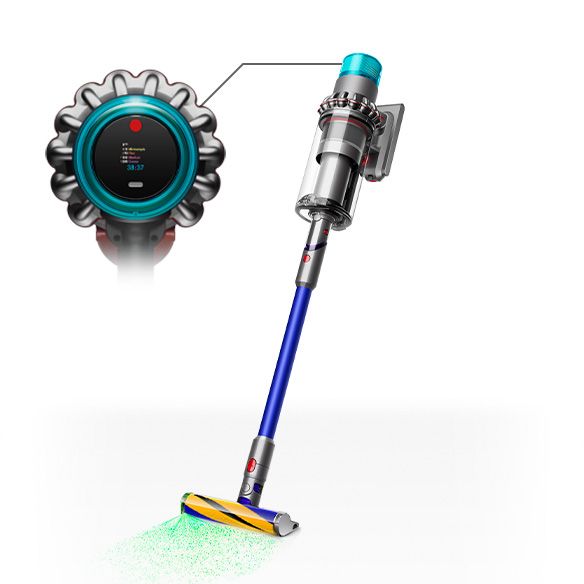 from $899.99Dyson Gen5outsize™
from $899.99Dyson Gen5outsize™ -
Dyson Gen5detect™️
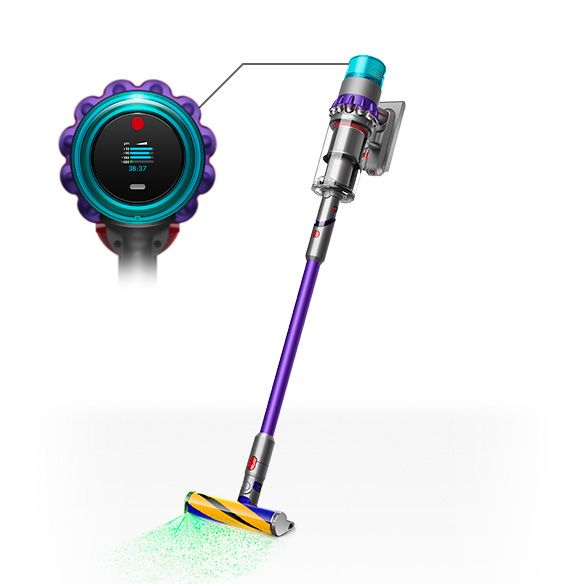 from $949.99Dyson Gen5detect™️
from $949.99Dyson Gen5detect™️ -
Dyson V15s Detect™ Submarine
New technology
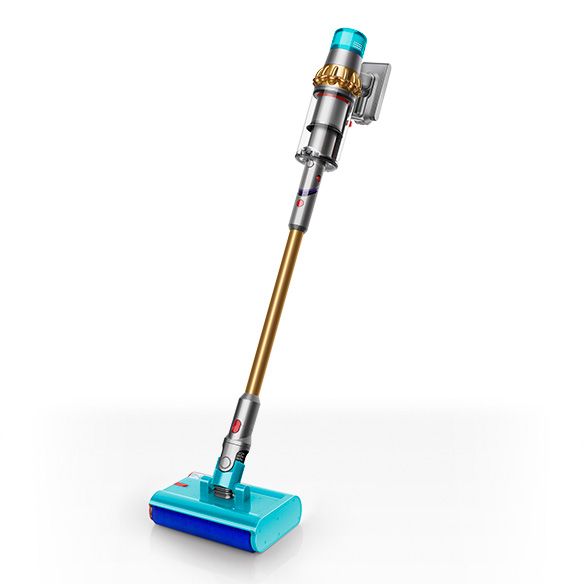 from $949.99Dyson V15s Detect™ Submarine
from $949.99Dyson V15s Detect™ Submarine -
Dyson V15™ Detect
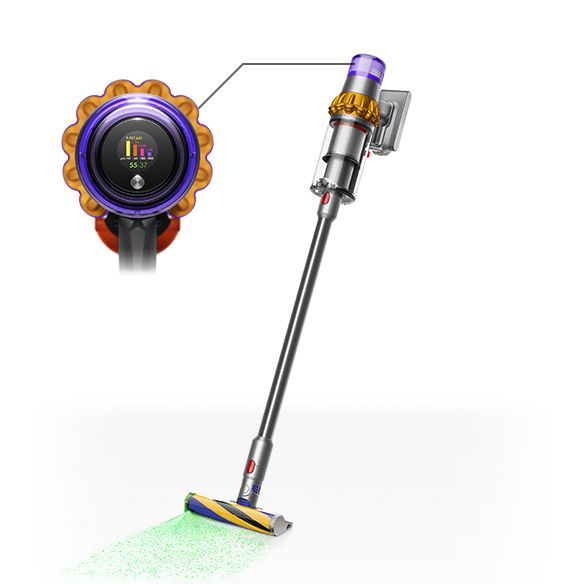 from $749.99Dyson V15™ Detect
from $749.99Dyson V15™ Detect -
Dyson V12™ Detect Slim
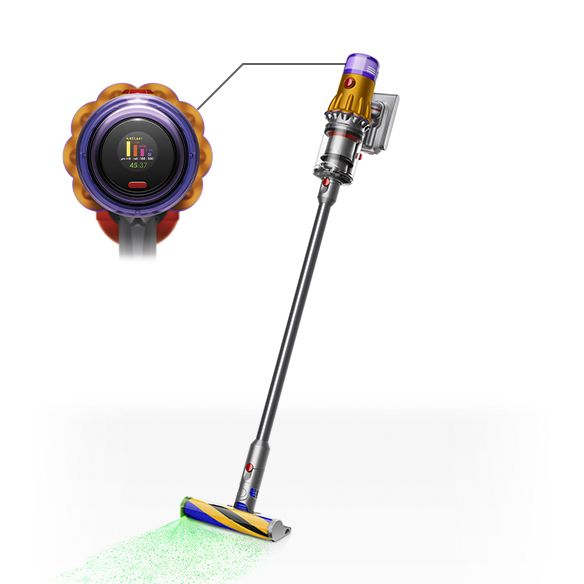 from $479.99Dyson V12™ Detect Slim
from $479.99Dyson V12™ Detect Slim -
Dyson Outsize
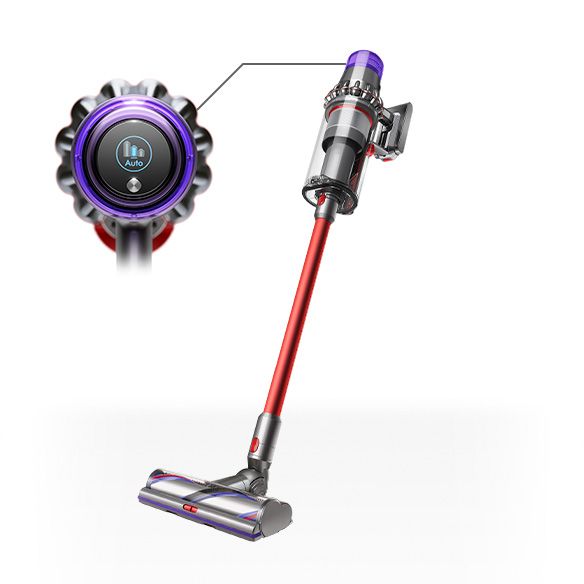 from $599.99Explore Dyson Outsize
from $599.99Explore Dyson Outsize -
Dyson V11™
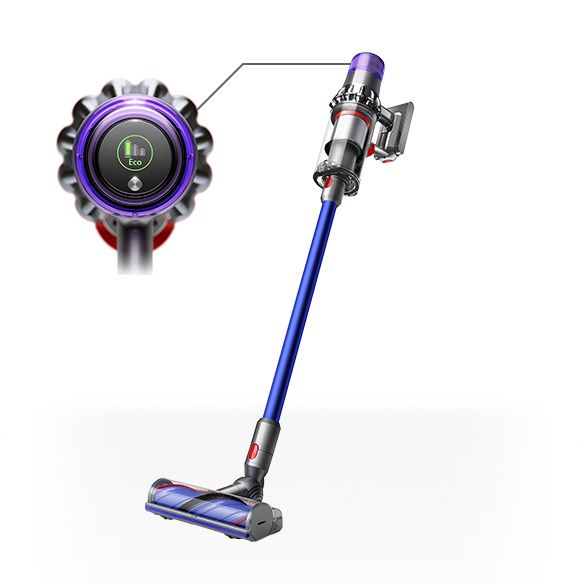 from $569.99Explore Dyson V11™
from $569.99Explore Dyson V11™ -
Dyson V8™
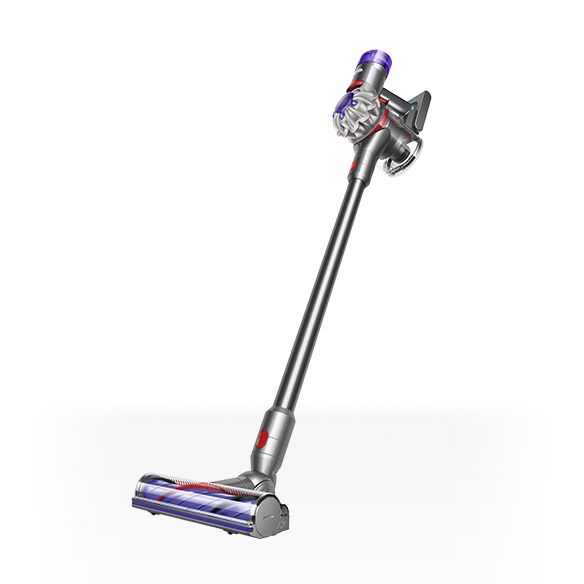 from $349.99Explore Dyson V8™
from $349.99Explore Dyson V8™
Wet Cleaning
Dyson Submarine™ wet roller head washes hard floors with clean water.
-
Dyson Gen5outsize™

-
Dyson Gen5detect™️

-
Dyson V15s Detect™ Submarine

-
Dyson V15™ Detect

-
Dyson V12™ Detect Slim

-
Dyson Outsize

-
Dyson V11™

-
Dyson V8™

Dyson dust illumination cleaner head
Precisely-angled light reveals hidden dust particles on hard floors
-
Dyson Gen5outsize™

-
Dyson Gen5detect™️

-
Dyson V15s Detect™ Submarine

-
Dyson V15™ Detect

-
Dyson V12™ Detect Slim

-
Dyson Outsize

-
Dyson V11™

-
Dyson V8™

Weight
-
Dyson Gen5outsize™
8.6 lbs
-
Dyson Gen5detect™️
7.6 lbs
-
Dyson V15s Detect™ Submarine
9.0 lbs
-
Dyson V15™ Detect
6.8 lbs
-
Dyson V12™ Detect Slim
5.2 lbs
-
Dyson Outsize
7.9 lbs
-
Dyson V11™
6.6 lbs
-
Dyson V8™
5.6 lbs
Suction power
Compared to Dyson V8™.
-
Dyson Gen5outsize™
Over 115% more suction
-
Dyson Gen5detect™️
Over 115% more suction
-
Dyson V15s Detect™ Submarine
100% more suction
-
Dyson V15™ Detect
100% more suction
-
Dyson V12™ Detect Slim
30% more suction
-
Dyson Outsize
90% more suction
-
Dyson V11™
60% more suction
-
Dyson V8™
Powerful Dyson suction
Runtime
Engineered for whole-home cleaning
-
Dyson Gen5outsize™
up to 140 mins**
-
Dyson Gen5detect™️
up to 70 mins*
-
Dyson V15s Detect™ Submarine
up to 60 mins*
-
Dyson V15™ Detect
up to 60 mins*
-
Dyson V12™ Detect Slim
up to 60 mins*
-
Dyson Outsize
up to 60 mins*
-
Dyson V11™
up to 40 mins*
-
Dyson V8™
up to 40 mins*
On/Off
-
Dyson Gen5outsize™
Button
-
Dyson Gen5detect™️
Button
-
Dyson V15s Detect™ Submarine
Trigger
-
Dyson V15™ Detect
Trigger
-
Dyson V12™ Detect Slim
Button
-
Dyson Outsize
Trigger
-
Dyson V11™
Trigger
-
Dyson V8™
Trigger
Cleaner head coverage
Cover more floor with each sweep or fit into tighter spaces
-
Dyson Gen5outsize™

12.6 in
-
Dyson Gen5detect™️

9.8 in
-
Dyson V15s Detect™ Submarine

9.8 in
-
Dyson V15™ Detect

9.8 in
-
Dyson V12™ Detect Slim

9.8 in
-
Dyson Outsize

9.8 in
-
Dyson V11™

9.8 in
-
Dyson V8™

9.8 in
Bin capacity
Bigger bins for bigger messes, smaller bins for lighter cleaning
-
Dyson Gen5outsize™

0.5 gallon
-
Dyson Gen5detect™️

0.2 gallon
-
Dyson V15s Detect™ Submarine

0.2 gallon
-
Dyson V15™ Detect

0.2 gallon
-
Dyson V12™ Detect Slim

0.1 gallon
-
Dyson Outsize

0.5 gallon
-
Dyson V11™

0.2 gallon
-
Dyson V8™

0.14 gallon
Engineered for homes with pets
Powerful Dyson suction, 3-in-1 format, tools, and filtration engineered to deep clean homes with pets
-
Dyson Gen5outsize™

-
Dyson Gen5detect™️

-
Dyson V15s Detect™ Submarine

-
Dyson V15™ Detect

-
Dyson V12™ Detect Slim

-
Dyson Outsize

-
Dyson V11™

-
Dyson V8™

Advanced technology
Number of cleaning modes
Choose between cleaning modes for the right power where you need it
-
Dyson Gen5outsize™
3 modes
-
Dyson Gen5detect™️
3 modes
-
Dyson V15s Detect™ Submarine
3 modes
-
Dyson V15™ Detect
3 modes
-
Dyson V12™ Detect Slim
3 modes
-
Dyson Outsize
3 modes
-
Dyson V11™
3 modes
-
Dyson V8™
2 modes
Auto mode
Automatically adjusts suction power for the right balance of run time and power where you need it⁺⁺
-
Dyson Gen5outsize™

-
Dyson Gen5detect™️

-
Dyson V15s Detect™ Submarine

-
Dyson V15™ Detect

-
Dyson V12™ Detect Slim

-
Dyson Outsize

-
Dyson V11™

-
Dyson V8™

LCD screen
Displays run time countdown, cleaning modes, and maintenance alerts.
-
Dyson Gen5outsize™

-
Dyson Gen5detect™️

-
Dyson V15s Detect™ Submarine

-
Dyson V15™ Detect

-
Dyson V12™ Detect Slim

-
Dyson Outsize

-
Dyson V11™

-
Dyson V8™

Reports total picked up particles
LCD screen displays your machine's total picked up particles for scientific proof of a deep clean
-
Dyson Gen5outsize™

-
Dyson Gen5detect™️

-
Dyson V15s Detect™ Submarine

-
Dyson V15™ Detect

-
Dyson V12™ Detect Slim

-
Dyson Outsize

-
Dyson V11™

-
Dyson V8™

Shows when your floor is clean
LCD screen displays color-coded bars that grow and shrink according to the amount of particles picked up as you clean- showing you when to keep cleaning and when to move on
-
Dyson Gen5outsize™

-
Dyson Gen5detect™️

-
Dyson V15s Detect™ Submarine

-
Dyson V15™ Detect

-
Dyson V12™ Detect Slim

-
Dyson Outsize

-
Dyson V11™

-
Dyson V8™

Filtration
Whole-machine advanced filtration expels cleaner air‡
-
Dyson Gen5outsize™

Filter traps 99.99% of particles as small as 0.1 microns
-
Dyson Gen5detect™️

Filter traps 99.99% of particles as small as 0.1 microns
-
Dyson V15s Detect™ Submarine

Filter traps 99.99% of particles as small as 0.3 microns*
-
Dyson V15™ Detect

Filter traps 99.99% of particles as small as 0.3 microns*
-
Dyson V12™ Detect Slim

Filter traps 99.99% of particles as small as 0.3 microns*
-
Dyson Outsize

Filter traps 99.99% of particles as small as 0.3 microns*
-
Dyson V11™

Filter traps 99.99% of particles as small as 0.3 microns*
-
Dyson V8™

Filter traps 99.99% of particles as small as 0.3 microns*
Filtration Traps viruses
Whole-machine HEPA filtration traps viruses. Expels cleaner air.¹
-
Dyson Gen5outsize™

-
Dyson Gen5detect™️

-
Dyson V15s Detect™ Submarine

-
Dyson V15™ Detect

-
Dyson V12™ Detect Slim

-
Dyson Outsize

-
Dyson V11™

-
Dyson V8™

Tools & accessories
De-tangling cleaner head for all floor types
Motorbar™ cleaner head deep cleans all floor types and clears wrapped hair from the brush bar as you clean
-
Dyson Gen5outsize™

-
Dyson Gen5detect™️

-
Dyson V15s Detect™ Submarine

-
Dyson V15™ Detect

-
Dyson V12™ Detect Slim

-
Dyson Outsize

-
Dyson V11™

-
Dyson V8™

Dyson Dust Illumination cleaner head for hard floors
Gentle on hard floors. Tough on dirt. Illuminates invisible dust on hard floors.
-
Dyson Gen5outsize™

-
Dyson Gen5detect™️

-
Dyson V15s Detect™ Submarine

-
Dyson V15™ Detect

-
Dyson V12™ Detect Slim

-
Dyson Outsize

-
Dyson V11™

-
Dyson V8™

Tools & accessories included
Includes Dyson-engineered tools and accessories to clean all areas of your home--and your car
-
Dyson Gen5outsize™
2 cleaner heads
6 accessories
-
Dyson Gen5detect™️
2 cleaner heads
6 accessories
-
Dyson V15s Detect™ Submarine
3 cleaner heads
Up to 7 accessories
-
Dyson V15™ Detect
2 cleaner heads
4 accessories
-
Dyson V12™ Detect Slim
2 cleaner heads
4 accessories
-
Dyson Outsize
1 cleaner heads
4 accessories
-
Dyson V11™
1 cleaner heads
4 accessories
-
Dyson V8™
Up to 2 cleaner heads
4 accessories
Built-in Dusting and Crevice tool
Dusting and Crevice tool built into the wand. Remove the wand in one click to reveal the tool, for continuous cleaning.
-
Dyson Gen5outsize™

-
Dyson Gen5detect™️

-
Dyson V15s Detect™ Submarine

*Included with Absolute model
-
Dyson V15™ Detect

-
Dyson V12™ Detect Slim

-
Dyson Outsize

-
Dyson V11™

-
Dyson V8™

Hair screw tool
Includes this mini motorized tool to pick up long hair and pet hair fast without tangles. For upholstery, stairs, and cars.
-
Dyson Gen5outsize™

-
Dyson Gen5detect™️

-
Dyson V15s Detect™ Submarine

-
Dyson V15™ Detect

-
Dyson V12™ Detect Slim

-
Dyson Outsize

-
Dyson V11™

-
Dyson V8™

Free-standing Floor Dok™ available
Free-standing dock to charge and store your vacuum with no need to drill into walls. Available for purchase separately.
-
Dyson Gen5outsize™

-
Dyson Gen5detect™️

-
Dyson V15s Detect™ Submarine

-
Dyson V15™ Detect

-
Dyson V12™ Detect Slim

-
Dyson Outsize

-
Dyson V11™

-
Dyson V8™

- Dyson Gen5outsize™ Shop now Explore Dyson Gen5™️ Outsize
- Dyson Gen5detect™️ Shop now Explore Dyson Gen5™️ Detect
- Dyson V15s Detect™ Submarine Shop now Explore Dyson V15s™️ Detect Submarine
- Dyson V15™ Detect Shop now Explore Dyson V15™ Detect
- Dyson V12™ Detect Slim Shop now Explore Dyson V12™ Detect Slim
- Dyson Outsize Shop now Explore Dyson Outsize
- Dyson V11™ Shop now Explore Dyson V11™️
- Dyson V8™ Shop now Explore Dyson V8™

